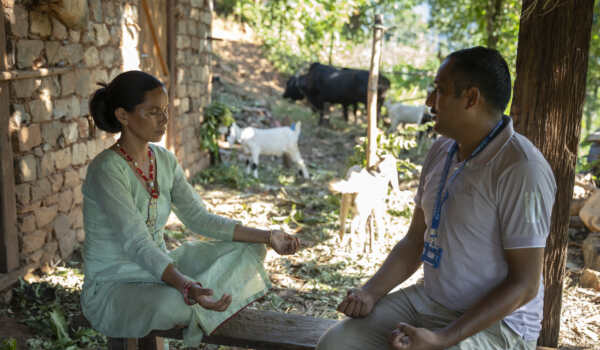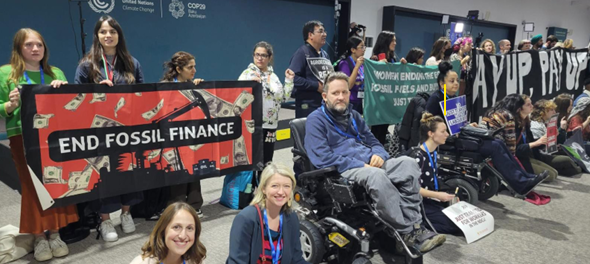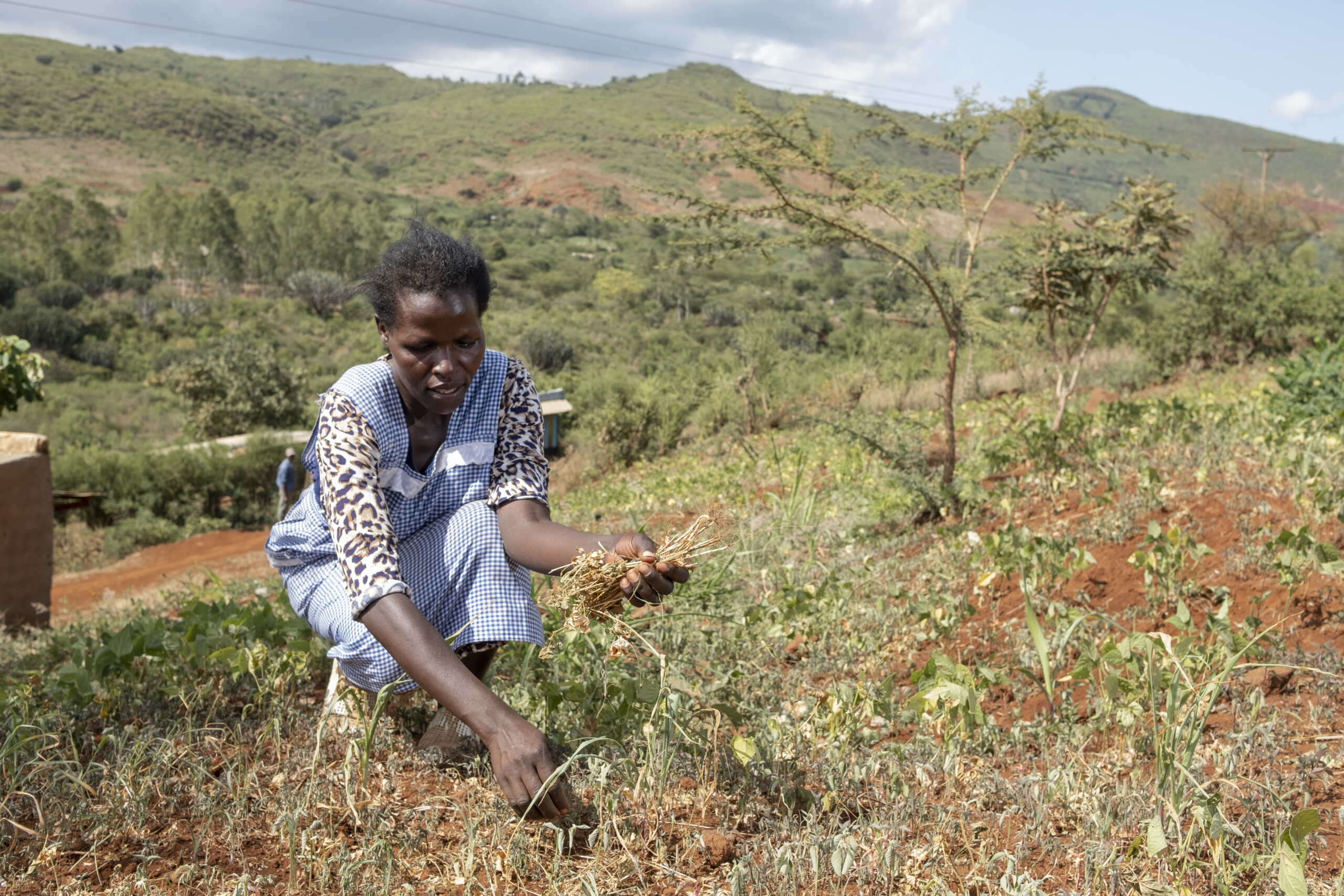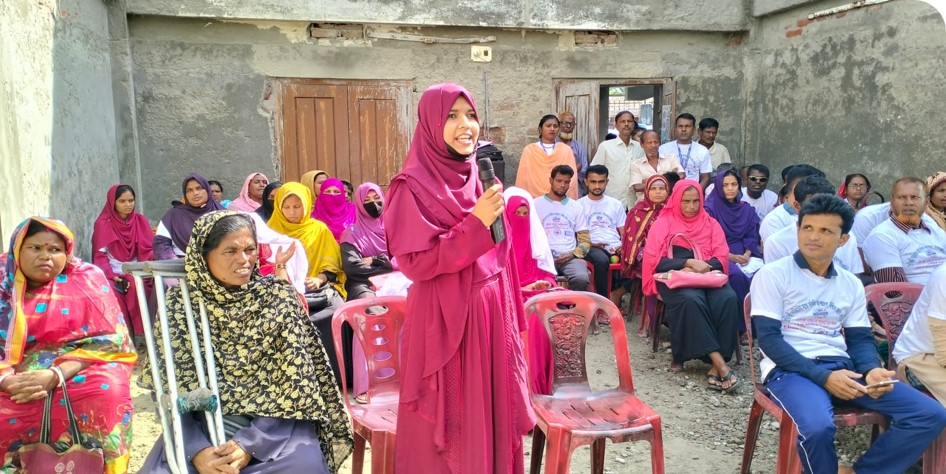The Vital Role of Mental Health and Psychosocial Support in Humanitarian Emergencies
News | October 15, 2025
Why Mental Health Cannot Be Overlooked
When disasters strike, whether through earthquakes, super typhoons, or man-made crises, the impact extends beyond physical destruction. These affect people’s wellbeing and sense of safety. The unseen wounds of trauma, grief, or distress can linger long after communities begin to rebuild. Just as food, water, and shelter are essential for survival, so too is mental health.
Yet, mental wellbeing is often overlooked in the urgency of humanitarian response. On this World Mental Health Day, we are reminded that ensuring access to Mental Health and Psychosocial Support (MHPSS) is not only a matter of compassion, but of equity and human rights.
Across the world, CBM Global and our partners demonstrate that even in the harshest emergencies, access to MHPSS services is both possible and vital. From the Asia to Africa, these stories reflect the power of timely, inclusive, and community-based (MHPSS) responses.

Philippines: Healing Begins Within Days
When disaster strikes, the first days and weeks are critical — not only for saving lives, but also for safeguarding mental health.
After Severe Tropical Storm Trami (Kristine) in the Philippines, CBM Global and our partners responded quickly. Within a week, a Psychological First Aid (PFA) refresher session was organised, followed by the deployment of trained volunteers to disaster-affected communities.
Working with Balik Kalipay Center, Simon of Cyrene, Caritas Diocese of Limbanan, and the Psychological Association of the Philippines, the teams provided psychosocial support, cash grants, and assistive devices.
Through these efforts, families not only received material assistance but also the reassurance that they were not alone — that their experiences, emotions, and hopes mattered.
Reflection: Access means making support available right from the start.
Indonesia: From Survival to Recovery
As communities move from immediate survival to long-term rebuilding, psychosocial needs evolve.
Following the West Java earthquake, CBM Global and our partners implemented community-based MHPSS programmes to help children return to safe and familiar routines and support adults through counselling and home visits.
In collaboration with the IBU Foundation, adults also learned healthy food preparation, reinforcing that healing the mind and body often go hand in hand.
These activities helped people regain a sense of normalcy, demonstrating how psychosocial support can strengthen resilience at both the individual and community levels.
Reflection: Healing is not just about overcoming trauma — it’s about restoring the rhythm of everyday life.
Bangladesh: Finding Hope Amid Displacement
In the sprawling Rohingya refugee camps, hundreds of thousands live with the trauma of displacement and uncertainty.
Through community-based MHPSS initiatives, CBM Global and partners provide counselling, peer support, and and home-based MHPSS services to individuals with disabilities, particularly those experiencing mobility challenges.
These safe spaces help restore hope, dignity, and connection. These affirm that even amidst displacement, healing begins with being heard and access to MHPSS is consistent, at home or in the service centre.
Reflection: Healing begins with being heard.
Nepal: Strengthening Preparedness for the Future
In August 2025, CBM Global Nepal in collaboration with the Non-Communicable Disease and Mental Health Unit of the Ministry of Health and Population, WHO Nepal, and CMC-Nepal to conduct the country’s first-ever training on integrating Mental Health and Psychosocial Support (MHPSS) into Disaster Risk Management (DRM).
Based on the IASC MHPSS READY package, the training gathered 23 representatives from government agencies, OPDs, and humanitarian organisations.
Participants strengthened both conceptual and practical skills across five modules — from MHPSS-DRM foundations and community engagement to risk assessments and planning. A special Suicide Prevention module was also introduced, recognising Nepal’s growing need to integrate suicide prevention in emergency preparedness.
By building local expertise and encouraging collaboration, the training contributes to more inclusive, resilient systems that protect and promote mental wellbeing before, during, and after crises.
Reflection: This training marks an important step in institutionalising MHPSS within disaster risk management across Nepal.
Mental Health and Neglected Tropical Diseases in Nigeria
When we think of catastrophes, we imagine a single tragic event. For many affected by Neglected Tropical Diseases (NTDs), catastrophe is not an event of the past but a constant presence.
Beyond the visible physical wounds, the emotional and mental scars from chronic illness and exclusion are often overlooked, representing a critical gap in emergency response. This is a mental health emergency that requires a focused and sustained response.
In Nigeria, CBM Global and its partners are delivering specialised mental health services to people who are often forgotten. This includes establishing peer support groups and creating safe spaces where persons affected by NTDs can connect, share experiences, and take collective action. Efforts also focus on expanding access to community-based mental health care, strengthening support networks, and promoting sustainable livelihood opportunities.
Reflection: True healing requires a people-centred approach with mental health at the heart of both chronic and acute emergencies
Voices from Africa: Mental Health as a Human Right
Across Africa, civil society organisations and organisations of persons with disabilities (OPDs) are also amplifying the call for inclusive, rights-based mental health systems. Through the African Mental Health Leadership Programme (MHLP), leaders and advocates are uniting to advance access to services for people most affected by conflict, disaster, and displacement.
“Let us move beyond awareness into action—to build resilient systems, empower survivors, and create a society where every person can recover, participate fully, and live with dignity. Mental health matters. Access matters. People matter.” — Rose Umutesi (Rwanda), Pan African Network for Persons with Psychosocial Disabilities Chair
This year’s World Mental Health Day theme, “Access to Services: Mental Health in Catastrophes and Emergencies,” reminds us that in times of crisis, people living with psychosocial disabilities and mental health conditions are often left behind. Barriers such as stigma, exclusion, and discrimination continue to deny many the care and dignity they deserve.
“Many people living with drug dependence are not criminals — they are individuals struggling with deep emotional pain, trauma, and untreated mental health conditions.” — Saadatu Mohammed Usman (Nigeria), Founder, BAFASA Hope Foundation
“No one should face trauma, loss, or fear alone. Mental health must be part of every emergency response.” — Jeanne d’Arc Nsabiyumva (Burundi), Country Coordinator, East African Community Mental Health Network
“Mental health is a right for everyone; protecting it means building resilience and peace in the Central African Republic. Mental health and internal security forces are essential for the effective protection of the population.” — Samba Flora Emmanuelle (Central African Republic), Présidente Fondatrice, ONG OBOUNI-RCA
“Finding out about a mental condition is the beginning of a different journey. Your life might not follow the path you imagined, but that’s okay. You are a victor, not a victim.” — Philani Ama Kinyabo (Zimbabwe)
These powerful reflections reaffirm a shared vision: mental health is a human right that must be protected, even — and especially — in emergencies.
They call on governments, partners, and communities to invest in inclusive, accessible, and rights-based mental health services that empower survivors, strengthen resilience, and uphold dignity for all.
Shared Lessons: Building Resilient Communities
While the contexts differ, the message is the same: mental health is essential to humanitarian response.
These experiences show that when MHPSS is community-driven, it can overcome barriers, strengthen resilience, and make recovery more inclusive. They also highlight how partnerships and local leadership ensure that support reaches those most at risk — including persons with disabilities and other marginalised groups.
A Call to Action
From climate-driven disasters to man-made crises, the need for accessible and inclusive MHPSS has never been more urgent. On this World Mental Health Day, we are reminded that access to mental health support is a lifeline.
By ensuring that these services are available, adaptable, and inclusive, we help communities move beyond survival to true recovery — laying the foundation for resilience, dignity, and long-term wellbeing.
Key Message for World Mental Health Day
Mental health must be recognised as a core component of humanitarian action — from preparedness to recovery, for all people, in every crisis
https://cbm-global.org/news/mental-health-and-psychosocial-support-in-humanitarian-emergencies
Related News

One in Five Is Not Enough: The gains on Disability Inclusion have not gone far enough
One in Five Is Not Enough: The gains on...

COP30 Is a Turning Point for Disability-Inclusive Climate Action
As the world gathers in Belém, Brazil, from 10–21 November 2025 for COP30, the message from...

Achieving resilience for all requires funding disability inclusion in DRR
On International Day for Disaster Risk Reduction (DRR) 2025,...
